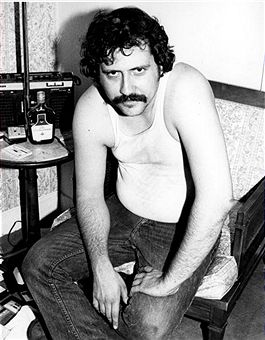
Leslie Conway "Lester" Bangs was an American music journalist and critic. He wrote for Creem and Rolling Stone magazines and was also a performing musician. The music critic Jim DeRogatis called him "America's greatest rock critic".
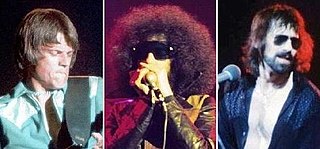
The J. Geils Band was an American rock band formed in 1967, in Worcester, Massachusetts, under the leadership of guitarist John "J." Geils. The original band members included vocalist Peter Wolf, harmonica and saxophone player Richard "Magic Dick" Salwitz, drummer Stephen Bladd, vocalist/keyboardist Seth Justman, and bassist Danny Klein. Wolf and Justman served as principal songwriters. The band played R&B-influenced blues rock during the 1970s and soon achieved commercial success before moving toward a more mainstream radio-friendly sound in the early 1980s, which brought the band to its commercial peak. They performed a mix of cover songs of classic blues and R&B songs, along with original compositions written primarily by Wolf and Justman, as well as some group compositions written under the pseudonymous name Juke Joint Jimmy, representing compositions credited to the entire band as a whole. After Wolf left the band in 1983 to pursue a solo career, the band released one more album in 1984 with Justman on lead vocals, before breaking up in 1985. Beginning in 1999, the band had several reunions until the death of its namesake, J. Geils, on April 11, 2017.
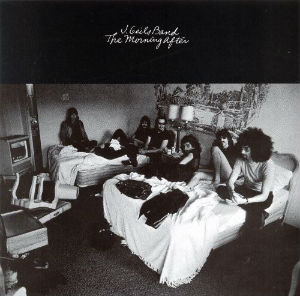
The Morning After is the second studio album by American rock band The J. Geils Band. The album was released in October 1971, by Atlantic Records. The song "Cry One More Time" was later covered by Gram Parsons on his first solo album.

Bloodshot is the third studio album by American rock band The J. Geils Band. The album was released on April 12, 1973, by Atlantic Records. It was the breakthrough release for the band, reaching #10 on the Billboard 200 album chart in the United States, a peak that the band would not surpass until their 1981 multi-platinum album Freeze Frame. The single version of "Give it to Me", which had a very different ending from the album version, reached #30 on the U.S. Billboard Hot 100 and #15 on the Cash Box Top 100.
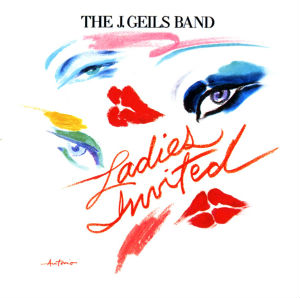
Ladies Invited is the fourth studio album by American rock band The J. Geils Band. The album was released in November 1973, by Atlantic Records.

Nightmares...and Other Tales from the Vinyl Jungle is the fifth studio album by American rock band The J. Geils Band. The album was released on September 25, 1974, by Atlantic Records.

Monkey Island is the seventh studio album by American rock band the J. Geils Band, though it is credited with the shortened band name of "Geils", the only album in their catalog for which this was done. The album was released on June 9, 1977, by Atlantic Records.

Sanctuary is the eighth studio album by American rock band the J. Geils Band. The album was released in November 1978 and is the first released by EMI Records.
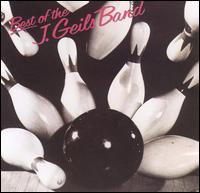
Best of the J. Geils Band is the first Best Of album by American rock band The J. Geils Band, released in 1979.

Love Stinks is the ninth studio album by American rock band the J. Geils Band. The album was released on January 28, 1980, by EMI Records.
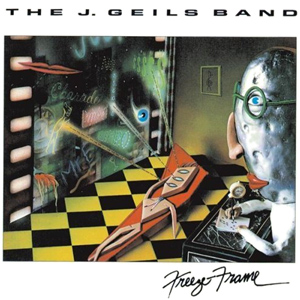
Freeze-Frame is the tenth studio album by American rock band the J. Geils Band, and the last one to feature original vocalist Peter Wolf. The album was released on October 26, 1981, by EMI Records. It reached number one on the United States Billboard 200 album chart in February 1982, and remained at the top for four weeks. The album featured the hit singles "Centerfold" and "Freeze Frame". "Angel in Blue" also reached the US Top 40.

You're Gettin' Even While I'm Gettin' Odd is the eleventh and final studio album by American rock band the J. Geils Band and the only one recorded without singer Peter Wolf. The band's keyboardist Seth Justman produced the album, did all the song and horn arrangements, wrote all the songs with lyrical help from Paul Justman, and provided the majority of the album's lead vocals, with drummer Stephen Jo Bladd singing lead on three tracks. Compared to the band's earlier works, which leaned towards a more live rock band sound, You're Gettin' Even While I'm Gettin' Odd emphasizes overdubbing and production. The album was released on October 5, 1984, by EMI Records.

Music of My Mind is the fourteenth studio album by American singer, songwriter, and musician Stevie Wonder. It was released on March 3, 1972, by Tamla Records, and was Wonder's first to be recorded under a new contract with Motown that allowed him full artistic control over his music. For the album, Wonder recruited electronic music pioneers Malcolm Cecil and Robert Margouleff as associate producers, employing their custom TONTO synthesizer on several tracks. The album hit No. 21 in the Billboard LP charts, and critics found it representative of Wonder's artistic growth, and it is generally considered by modern critics to be the first album of Wonder's "classic period".

Second Helping is the second studio album by Lynyrd Skynyrd, released on April 15, 1974. It features the band's biggest hit single, "Sweet Home Alabama", an answer song to Neil Young's "Alabama" and "Southern Man", which reached #8 on the Billboard Hot 100 chart in August 1974.

The World Is a Ghetto is the fifth album by American band War, released in late 1972 on United Artists Records. The album attained the number one spot on Billboard, and was Billboard magazine's Album of the Year as the best-selling album of 1973. In addition to being Billboard's #1 album of 1973, the album was ranked number 444 on Rolling Stone magazine's original list of the 500 greatest albums of all time. The title track became a gold record.
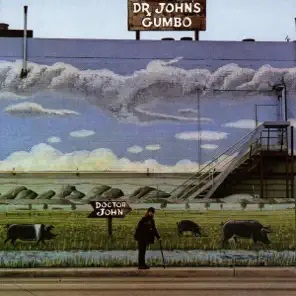
Dr. John's Gumbo released in 1972 is the fifth album by New Orleans singer and pianist Dr. John, a tribute to the music of his native city. The album is a collection of covers of New Orleans classics, played by a major figure in the city's music. It marked the beginning of Dr. John's transition away from the eccentric stage character that earned him a cult following, and toward a more straightforward image based on New Orleans' R&B traditions.

Manassas is the 1972 debut double album by Manassas, a blues rock group led by American musician Stephen Stills, released April 1972. It was a critical comeback for Stills, and continued his commercial success by being certified Gold only a month after being released and peaking at number 4 on the US charts.

Stephen Stills is the debut solo album by American musician Stephen Stills released on Atlantic Records in 1970. It is one of four high-profile albums released by each member of Crosby, Stills, Nash & Young in the wake of their 1970 chart-topping album Déjà Vu, along with After the Gold Rush, If I Could Only Remember My Name and Songs for Beginners. It was primarily recorded between CSNY tours in London and Los Angeles. It was released in the United States on November 16, 1970, and in the United Kingdom on November 27, 1970.

Still Bill is the second studio album by American soul singer-songwriter and producer Bill Withers, released in 1972 by Sussex Records. The album was recorded and produced by Withers with musicians from the Watts 103rd Street Rhythm Band. The rhythmic music produced for the record features soul, funk, and blues sounds, backing lyrics that explore themes of human nature, emotion, and sex from a middle-class male perspective. It also features some of Withers' most popular songs, including the hit singles "Lean on Me" and "Use Me". A commercial and critical success at the time of its release, Still Bill has since been regarded by music journalists as a highlight of the singer's recording career and a classic of 1970s R&B.

Doug Sahm and Band is the debut solo album of American singer-songwriter Doug Sahm. In 1972, after leaving the Sir Douglas Quintet, Sahm moved to Austin, Texas. He was signed by Jerry Wexler to the newly opened country music division of Atlantic Records, and started the album sessions by October 1972. It featured appearances by Bob Dylan, Dr. John, David "Fathead" Newman, Flaco Jimenez, David Bromberg and Kenny Kosek.




















